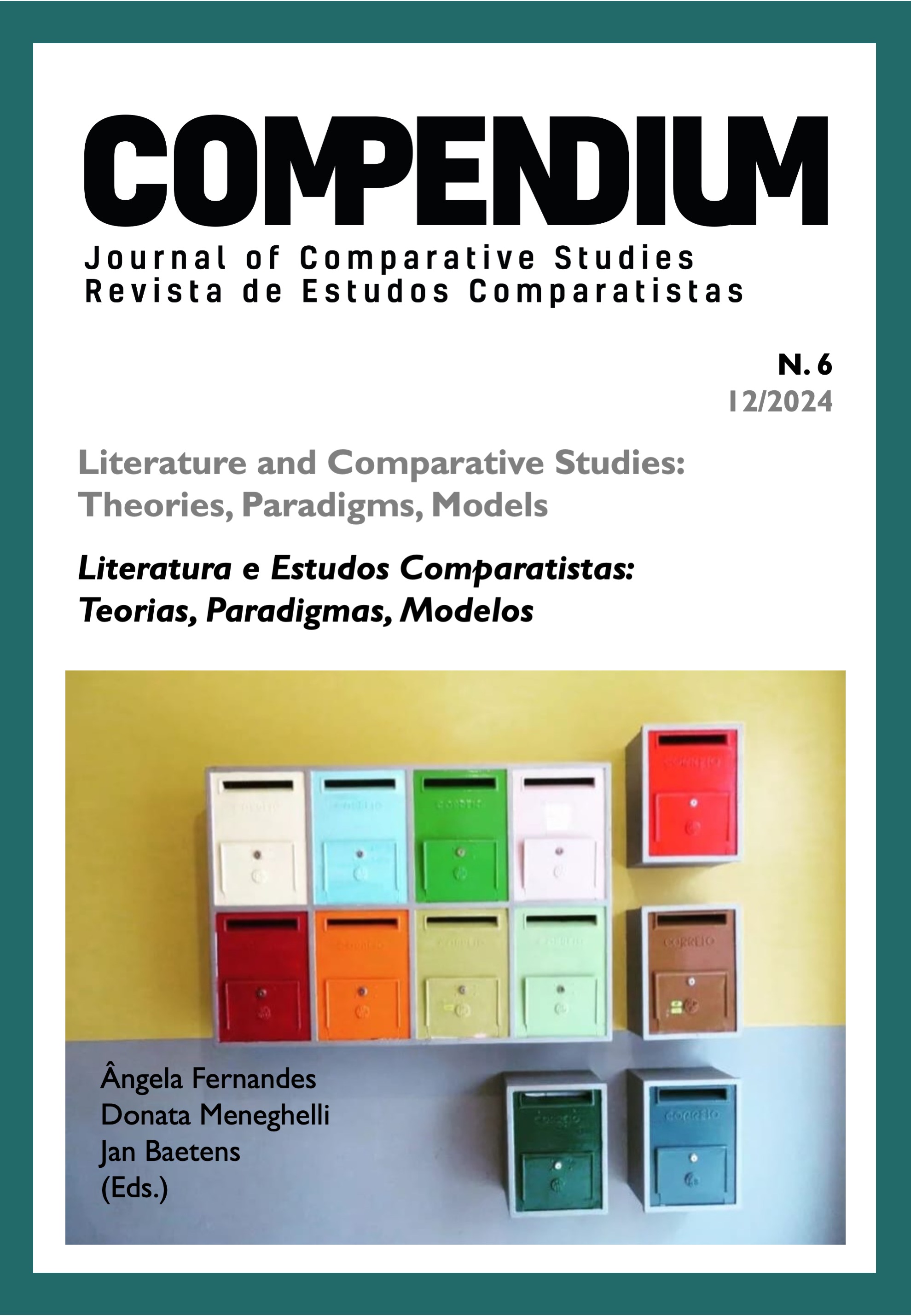Pourquoi ces choses et non pas d’autres
Attention and Lists in Comparative Literature
DOI:
https://doi.org/10.51427/com.jcs.2024.6.5Palavras-chave:
cânone, antologia, crise, catálogo, fronteiraResumo
A partir de uma curta citação de Le Mariage de Figaro, de Beaumarchais, tomada como lema, o presente artigo desenvolve uma reflexão sobre questões importantes da literatura comparada, nomeadamente, questões de inclusão e exclusão na delimitação das fronteiras da disciplina. No âmbito de discussões recentes acerca do papel e modos de atenção na sociedade contemporânea, propõe-se que o problema pode ser entendido, em termos gerais, como uma questão de atenção e suas técnicas, e que a literatura comparada pode ser assim tida como o estudo prático e teórico da atenção. Por fim, considera-se brevemente o papel central da lista nas produções materiais da literatura comparada (cânones, syllabi, antologias) enquanto manifestações desta identidade atencional.
Downloads
Referências
Alber, Jan. 2016. “Absurd Catalogues: The Functions of Lists in Postmodernist Fiction”. Style 50 (3): 342-358. https://doi.org/10.5325/style.50.3.0342.
Apter, Emily. 2009 [2006]. “A New Comparative Literature”. In The Princeton Sourcebook in Comparative Literature: From the European Enlightenment to the Global Present, edited by David Damrosch et al, 409-420. Princeton: Princeton University Press.
Beaumarchais, Pierre Augustin Caron de. 1953 [1784]. Le Mariage de Figaro ou La Folle Journée. Paris: Éditions du Seuil,
Bloom, Harold. 1994. The Western Canon: The Books and School of the Ages. New York: Harcourt Brace.
Bogost, Ian. 2012. Alien Phenomenology‚ or What It’s Like to Be a Thing. Minneapolis: University of Minnesota Press.
Buescu, Helena Carvalhão. 2013. Experiência do Incomum e Boa-Vizinhança: Literatura-Comparada e Literatura-Mundo. Porto: Porto Editora.
Burnett, Graham D., and Justin E. H. Smith. 2023. “Introduction”. In Scenes of Attention: Essays on the Mind, Time, and the Senses, edited by Graham D. Burnett and Justin E. H. Smith, 1-19. New York: Columbia University Press.
Curtius, Ernst Robert. 1979 [1948]. European Literature and the Latin Middle Ages. London: Routledge and Kegan Paul.
Damrosch, David. 2016. “The World in a Journal”. Journal of World Literature 1: 1-7. https://doi.org/10.1163/24056480-00101001.
Deluy, Henri. 1996. Une anthologie immédiate. Paris : Fourbis.
Derrida, Jacques. 1972. “La pharmacie de Platon”. La Dissémination. Paris: Éditions du Seuil. eBook.
Errera, Eglal. ed. 2013. Les Poètes de la Mediterranée: Anthologie. Paris: Gallimard.
Eco, Umberto. 2009. The Infinity of Lists. Translated by Alastair McEwen. New York: Rizzoli.
Fish, Stanley. 1980. Is There a Text In This Class?: The Authority of Interpretative Communities. Cambridge: Harvard University Press.
Ganeri, Jonardon. 2017. Attention, Not Self. Oxford: Oxford University Press.
Goody, Jack. 1978. The Domestication of the Savage Mind. Cambridge: Cambridge University Press.
Hayles, N. Katherine. 2007. “Hyper and Deep Attention: The Generational Divide in Cognitive Modes”. Profession (1): 187-199. https://doi.org/10.1632/prof.2007.2007.1.187.
Heaney, Seamus, and Ted Hughes, eds. 1982. The Rattle Bag. London: Faber and Faber.
Izmirlieva, Valentina. 2008. All the Names of the Lord: Lists, Mysticism and Magic. Chicago: The University of Chicago Press.
Marx, William. 2020. “Vivre dans la bibliothèque du monde: Leçon inaugurale prononcée au Collège de France le jeudi 23 janvier 2020”. Accessed June 2, 2024, books.openedition.org/cdf/10167?.
Meltzl, Hugo. 2009 [1877]. “Present Tasks of Comparative Literature”. In The Princeton Sourcebook in Comparative Literature: From the European Enlightenment to the Global Present, edited by David Damrosch et al., 41-49. Princeton: Princeton University Press.
Perec, Georges. 1985. Penser/Classer. Paris: Hachette. eBook.
Reinhard, Kenneth. 1995. “Kant with Sade, Lacan with Levinas”. MLN 110 (4): 785-808. https://dx.doi.org/10.1353/mln.1995.0077.
Rorty, Richard. 2006. “Looking Back at Literary Theory”. In Comparative Literature in the Age of Globalization, edited by Haun Saussy, 63-67. Baltimore: The Johns Hopkins University Press.
Sammons, Benjamin. 2010. The Art and Rhetoric of the Homeric Catalogue. Oxford: Oxford University Press.
Saussy, Haun. 2006. “Exquisite Cadavers Stitched from Fresh Nightmares: Of Memes, Hives, and Selfish Genes”. In Comparative Literature in the Age of Globalization, edited by Haun Saussy, 3-42. Baltimore: The Johns Hopkins University Press.
Schiff, Hilda. 1995. Holocaust Poetry. New York: St. Martin’s Press.
Schmandt-Besserat, Denise. 1996. How Writing Came About. Austin: University of Texas Press.
Sève, Bernard. 2010. De haut en bas: philosophie des listes. Paris : Éditions du Seuil.
Shakespeare, William. 1997. The Complete Plays: Histories I. London: The Folio Society.
Simon, Peter, ed. 2012. The Norton Anthology of World Literature. New York: W. W. Norton & Company.
Smith, Justin E. H. 2022. The Internet Is Not What You Think It Is: A History, A Philosophy, A Warning. Princeton: Princeton University Press. eBook.
Spivak, Gayatri Chakravorty. 2003. Death of a Discipline. New York: Columbia University Press.
Stiegler, Bernard. 2010. Taking Care of Youth and the Generations. Translated by Stephen Barker. Stanford: Stanford University Press.
Stiegler, Bernard. 2014. Symbolic Misery: Volume I: The Hyperindustrial Epoch. Translated by Barnaby Norman. Cambridge: Polity Press.
Van De Mieroop, Marc. 2016. Philosophy Before the Greeks: The Pursuit of Truth in Ancient Babylonia. Princeton: Princeton University Press
Wellek, René. 2009 [1959]. “The Crisis of Comparative Literature”. In The Princeton Sourcebook in Comparative Literature: From the European Enlightenment to the Global Present. edited by David Damrosch et al., 161-173. Princeton: Princeton University Press.
Young, Liam Cole. 2017. List Cultures: Knowledge and Poetics from Mesopotamia to Buzzfeed. Amsterdam: Amsterdam University Press.
Downloads
Publicado
Como Citar
Edição
Secção
Licença
Direitos de Autor (c) 2024 Bernardo Diniz Ferreira

Este trabalho encontra-se publicado com a Licença Internacional Creative Commons Atribuição 4.0.
A Compendium oferece acesso aberto integral a todos os números. Os autores mantêm a posse do copyright e concedem à revista o direito de fazer a primeira publicação do seu trabalho nos termos de uma licença Creative Commons Attribution 4.0 International (CC BY 4.0), que permite a terceiros partilharem o trabalho com a condição de atribuição de autoria e de referência à publicação inicial nesta revista.











